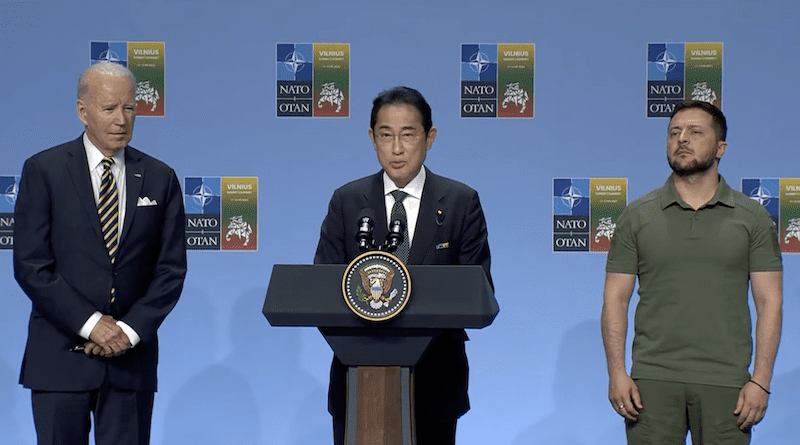NATO Vilnius Summit And Indo-Pacific Security – OpEd
The NATO Summit 2023 recently concluded at Vilnius, Lithuania leaves no doubt that NATO, while continuing as a Euro-Atlantic Alliance catering for security of Europe and of United States, is seriously concerned about the security and stability of the Indo Pacific Region extending from the Western Rim of the Pacific Ocean to the Eastern Rim of the Indian Ocean.
NATO perceives China as a systemic threat to the security and stability of the Indo Pacific Region and to Europe too especially with Chinese strategic forays in Eastern Mediterranean and Southern Europe.
China’s clandestine military infusions to Russia’s flagging military misadventure in Ukraine are perceived as a complicating European security by China whose natural geopolitical and strategic domain is Indo Pacific. With such Chinese manifestations China has demonstrated that because of the Russia-China Axis, European security and Indo Pacific security get intertwined.
Can NATO therefore as a consequence be oblivious to the China Threat to Indo Pacific security impacting European security because of the ‘Russia Connection’?
Reflective of this was the NATO invitation to the ‘Pacific Four’ comprising South Korea, Japan, Australia and New Zealand to attend the NATO Summit 2023. All these four nations are linked to United States security linkages in the Pacific. All these four nations stand strongly committed to United States security template for the Pacific Region and also to the larger Indo Pacific expanse.
While NATO has yet to spread its security wings fully in the Indo Pacific, the Major Powers of Europe have a significant stake in security of the Indo Pacific manifested by their bilateral security linkages to the Pacific Four and the United States too. In addition France and UK have security ties with India which United States perceives as the “Pivot of Indo Pacific security.
In early 2023, NATO Secretary General Stoltenberg visited South Korea and Japan for security consultations, including setting up a NATO Liaison Office in Tokyo, Japan which was widely welcomed.
However, France had expressed reservations on establishing a NATO Liaison Office in Tokyo asserting that NATO’s critical priority was the security of Europe. Presumably, this French reservation may be impelled by France not wishing to be drawn into a collective NATO involvement in Indo Pacific against China.
France is one of the three Major Powers of Indo Pacific with island territories in both Pacific and Indian Oceans. France is committed to Indo Pacific security as recently asserted during Indian PM Narendra Modi’s visit to France where declarations were made of both France and Indi were “committed” to a Free & Open Indo Pacific. Implicit in this assertion lurks the China Threat.France may have been piqued by United States excluding France from AUKUS security grouping and keeping AUKUS as an Anglo Saxon grouping,
Notwithstanding the above, the fact that France maintains a naval presence in the Indian Ocean indicates that China does figure as an ‘over the horizon’ threat in French security planning.
Shelving the opening of a NATO Liaison Office in Tokyo for the moment does not detract NATO planning for the China Threat not only in systemic terms but also figuring in individual threat perceptions of NATO’s Major Powers.
Japan and South Korea maintain ‘Consultative Mechanisms’ with NATO and a lot of security dialogues and discussions occur regularly between NATO and Japan and South Korea. Both Japan and South Korea seriously perceive that China may be tempted to repeat a ‘Ukraine Misadventure’ on Taiwan which would seriously impact security of their two Nations and stability of Indo Pacific.
To that end, one can expect an intensification of NATO’s involvement in security of Taiwan, Japan and South Korea.
Notably, what cannot be forgotten is that the United States has substantial security stakes in both European security and Indo Pacific security and linkages of these two ends of the global geopolitical spectrum would at some stage draw-in NATO’s deeper involvement in Indo Pacific security.
Concluding, one could safely assert that China’s unrestrained and irresponsible military belligerence would stoke the demands of both NATO’s deeper and integrated involvement in Indo Pacific security besides the inevitable mushrooming of an Eastern NATO.

